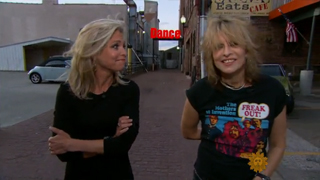Could you name four or five specific records that influenced you early on?
Yes. "Alley Oop" by the Hollywood Argyles—just a feeling that came from it. I'm afraid I'm not very technical
on things like that and all I can say, at best, is that it was a feel
that I had an empathy with. I don't know what it was whether it was the
zaniness of the record or what.
Is that the one about the caveman?
Yes, and that was Kim Fowley as a matter of fact. He was the Hollywood Argyle that did it, and I loved parody because . . .
Zappa?
Yes,
I admire Zappa, but there again I prefer Charlie Mingus. I like my
parody to be a little softer because I'm a pacifist by nature and
hostility in any form, even on a mental level, I find not endearing. I
think Zappa may have a problem with feeling that he was not accepted on a
Mingus level and he had to find himself an audience. I don't think he's
ever forgotten that.
But "Pithecanthropus Erectus" is not quite the same as "Brown Shoes Don't Make It."
Well,
that's the strength of my view on parody. I'm a softer person by
nature. I'm not hostile. I don't believe I'm an aggressive performer,
either. I like the situation that seems to develop with the audience
which is generally on a very human level and they're quite friendly.
It's neither screamy nor rebellious: it just has a good feeling to it. I
love my audiences. I think I've not been to too many gigs, where the
feeling is not nice. It's a very warm feeling I get from audiences.
[...]
The other great New York record of our times is "Summer In The City."
Yeah,
I agree with that. I was a devoted fan of the [Lovin'] Spoonful. I
loved them. Another record was the Mingus Oh Yeah album, particularly
"Ecclesiastic," which I drew an enormous amount of pleasure from. I felt
it was very 1990s—very 2001—that whole album. I was into that sort
of jazz. Before Santana came, I was into the English scene and I was
never able to relate to that stuff because of my earlier interest in
Coltrane and Mingus as well. A lot of Zappa's things flatten me,
actually.
Any of Zappa's stuff make it with you?
We're
Only In It For The Money, because I mean I saw huge potential in that
area for Zappa, but I don't understand Zappa and I'm not that intrigued
by him to try to unwrap his problems or try to find out why.
